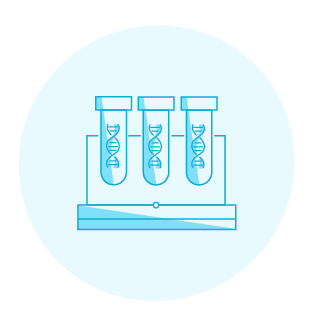What is a Whole Exome Sequencing (WES) Analysis?

Whole Exome Sequencing (WES), sequences the complete coding region of the genome. It is designed to examine all the coding regions and splice junctions of the genome. This method can be used to identify variations in the protein-coding region of any gene, rather than in only a select few genes. Because most known disease causing mutations occur in exons, whole exome sequencing can be used more effectively than whole genome sequencing.

When should you consider a Whole Exome Sequencing (WES) test?

- Can be considered for certain patients where the combination of symptoms does not allow an exact diagnosis/phenotype of suspected genetic disease.
- Situations where delayed differential diagnosis may have a significant impact on the patient’s quality of life.
- In certain cases where a stepwise diagnostic strategy often substantially increases costs and time
- Physician cannot provide any plausible diagnosis from the symptoms
- Where there is no other alternate technique to confirm the diagnosis and to end the diagnostic odyssey
Who should undergo Whole Exome Sequencing (WES) Test?
- Patient with undiagnosed genetic disease (extensive evaluation and multiple genetic tests, without identifying the etiology)
- Patients presenting with Heterogeneous phenotypes:
- Intellectual disability / developmental delay
- Cardiomyopathy; Epilepsy; Undiagnosed metabolic disorder; Immunodeficiency
- Ataxia; Neuropathy; Deafness
- Bone and connective tissue disorders; Short stature; Complex dysmorphic features
- Whole Exome Analysis can be used to identify variants inherited from the parents causing recessive disease or dominant disease. Additionally, Trio Analysis de novo variants that occur in the offspring but are not present in either of the parents can also be detected
What is the test methodology?
Next-generation Sequencing using genomic DNA extracted from blood, the coding regions of all the genes are captured and sequenced simultaneously by NGS technology on an Illumina platform. The sequence data that is generated is aligned and analyzed for sequence variants.
Why should you consider MedGenome’s Whole Exome Sequencing (WES) test?
Confronting the diagnostic challenge with whole exome sequencing is the best choice when you need a fast and cost-effective one-step solution to complete the diagnostic process of complex and unsolved cases.
- Uniform coverage across exome region with a mean depth of >80-100X. More than 98% of targeted base pairs covered at ≥10x
- All protein-coding regions along with the intron-exon boundary regions of ~23,000 genes and mitochondria encoded genes
- Comprehensive detection and analysis of both SNVs and CNVs. Sensitivity of detecting CNVs is 75-99% depending on the length and zygosity of the del/dup
- Requisite quality control steps throughout the workflow from the laboratory sample processing till the interpretation ensures consistency, validity and accuracy of results
- Report reviewed by Clinical Geneticist
- Samples process at out College of American Pathologist (CAP) approved laboratory
- Pre and Post Test Genetic Counselling
Test sample requirements
 Blood (3-5ml in EDTA tubes)
Blood (3-5ml in EDTA tubes)
Required forms
- Relevant clinical information including all the clinical presentations and symptoms
- Test request form
Turn around time (TAT)
28 Working Days for NGS
 Extracted DNA samples (1µg high-quality DNA)
Extracted DNA samples (1µg high-quality DNA)
GET GENETIC COUNSELLING

ACTIA offers all your patients pre & post-test genetic counselling with our expert and certified genetic counsellors:
Best available support for your patients and families via
- Latest technologies
- Helpful customer service
- Clear result interpretation
- Counselling sessions with our Genetic Counsellors


 Enquire
Now
Enquire
Now